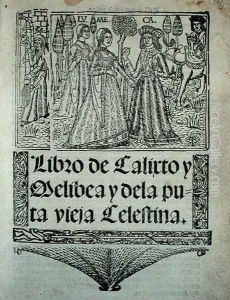Fernando de Rojas Paintings
Fernando de Rojas was a Spanish author and dramatist, best known for his only surviving work, 'La Celestina' (originally titled 'Comedia de Calisto y Melibea'), which is considered one of the greatest works of Spanish literature. The exact date of Rojas's birth is not known, but he is believed to have been born around 1470 in La Puebla de Montalbán, in the province of Toledo. His family was of converso origin, meaning they were Jews who had converted to Christianity, a fact that had significant impact on his life and work due to the socio-religious tensions in Spain during that period.
Rojas received a good education, studying law at the University of Salamanca, where it's believed he began writing 'La Celestina.' The work is often categorized as a novel, play, or a unique hybrid of both, and it reflects the complex transition from the medieval world to the Renaissance. 'La Celestina' is a tragic comedy of love, rich in character development and dialogue, exploring themes such as love, desire, and social status. Its psychological depth and realism were innovative for the time and heralded the beginning of the Spanish Renaissance literature.
Aside from his literary work, Rojas led a career as a legal professional. After completing his studies, he served as an alcalde (a municipal magistrate) and later as a legal advocate. Rojas's legal background influenced his writing, as seen in the legal terminology and realistic portrayal of the social customs in 'La Celestina.'
Rojas's death occurred in Talavera de la Reina, Spain, in 1541. His legacy rests almost entirely on 'La Celestina,' which has been translated into numerous languages and adapted into various artistic forms, including theater and opera. The work's influence extends beyond literature; it provides valuable insights into the social dynamics and cultural milieu of late 15th-century Spain. Despite the singularity of his known literary output, Fernando de Rojas holds a significant place in the pantheon of Spanish literature.
